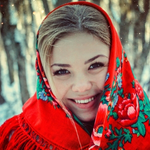12 interesting facts about Russian language
- The name Red Square (Russian: Кра́сная пло́щадь) has nothing to do with communism, but derives from the word "krasnyi" (Russian: кра́сный), which once meant "beautiful".
- There are only about 200,000 words in the Russian language. This number has doubled since the 19th century, when only 50,000-100,000 words were recorded in dictionaries. This number is very small compared to the English language, which is comprised of over 1,000,000 words. Russians actually use very few of these words, and you will find that due to this many words have more than one meaning.
- The word "vodka" (Russian: во́дка) derives for the word "voda", which means "water".
- If you plan on being an astronaut, learning Russian is essential. Russian is considered to the the international language of space, and in the event of an emergency instructions are given to astronauts in Russian. Part of training to become an astronaut (really we should say cosmonaut) even includes doing a homestay in Moscow to learn local lingo.
- The word "Tsar" (Russian: царь t͡sarʲ, English /ˈzɑːr/) derives from Latin Caesar "hairy".
- Russian is the most widespread language over Eurasia. Out of all European native languages it is the largest, and it is the most spoken out of all Slavic languages by a long shot. Overall, it is the 7th most spoken language in the world.
- "Dacha" (Russian: да́ча) - a country house or cottage in Russia. In archaic Russian, the word dacha means something given. Initially they were small estates in the country, which were given to loyal vassals by the tsar. Typical Soviet dachas were small 600 square meters (0.15 acres) land plots, given by state to city dwellers where people built their summer houses and grew little gardens.
- The word "spasibo" (Russian: спаси́бо - thank you) was originally "спаси бог", literally “god save”. So when you were thanking someone, you were asking god’s blessing for that person.
- "Russia" - 1530s, from Medieval Latin Russi "the people of Russia," from Rus, the native name of the people and the country (source of Arabic Rus, Medieval Greek Rhos), originally the name of a group of Swedish merchant/warriors who established themselves around Kiev 9c. and founded the original Russian principality; perhaps from Ruotsi, the Finnish name for "Sweden," from Old Norse Roþrslandi, "the land of rowing," old name of Roslagen, where the Finns first encountered the Swedes. This is from Old Norse roðr "steering oar," from Proto-Germanic rothra- "rudder," from PIE rot-ro-, from root *ere- "to row."
- The word for “German” in Russian is “неме́цкий” (nemetski) which means “those who can’t speak”. The root of the word originates in the Russian word meaning “mute”, which incidentally also means “stupid” and “inarticulate”. "Hемецкий" was originally the word that was used for all foreigners who could not speak Russian, however most foreigners at the time were Germans, and the name stuck with them.
- Native Russian speakers are better at distinguishing between different shades of the colour blue than native English speakers. This is due to the fact that the Russian language splits the color blue into two completely different categories - "си́ний" (“seeniy” meaning dark blue) and "голубо́й" (“goluboy” meaning light blue). In a study performed on native Russian and native English speakers, it was found that native Russian speakers are significantly more successful at distinguishing and categorising different shades of blues in comparison to native English speakers.
- The Russian cyrillic alphabet has 33 letters divided into 10 vowels, 21 consonants and 2 letters which do not have a sounds. Each letter can be either capital or small. They can also be printed or handwritten.
December 20, 2017





